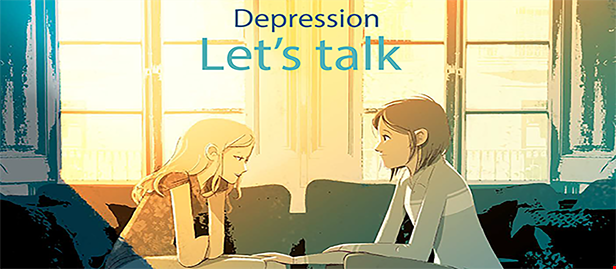Depression – In and Out of a Dark Tunnel
 ©WHO
©WHO
Depression is the leading cause of ill health and disability worldwide. Lack of support for people with mental disorders prevent many from accessing the treatment they need to live healthy, productive lives. Read here the testimony from Matthew, our EPF Youth Group Intern, on why depression is also a matter of importance for the young generation. #LetsTalk
According to the latest estimates from WHO, more than 300 million people are now living with depression[1] At the occasion of World Health Day 2017, the WHO is leading a campaign aiming that more people with depression, everywhere in the world, both seek and get help.
“When a person is depressed but aware the depression is temporary, it becomes easier to keep fighting through it. The tunnel is a horrible place to be, but when there's a light at the end, it's easier to put one foot in front of the other.” – Stephen Fry (comedian, actor, writer, presenter, and activist)
We all tend to feel comfortable telling the people around us when we have back pain, a bone fracture or most other long term physical illnesses… but what about mental illness? What about depression? How many people feel comfortable telling their loved ones and others close to them: my pain is emotional?
You may think that people who smile must be happy with their lives but truth of the matter is otherwise. Depression is an illness which many choose to hide with a smile, a laugh, a joke that is merely a mask. A mask they use to conceal long-term feelings of sadness, hopelessness, anger and rage, poor self-esteem or guilt, possible substance abuse or even suicidal thoughts amongst many other symptoms of long term depression. Yet even as we learn more about depression, its root causes and how to best treat it on patient-by-patient basis: the central question that remains is why so many people with depression are afraid to admit that they suffer from it in the first place.
This question is of course rhetorical. Many with this condition fear that disclosing it would result in exclusion from social circles, unemployment, ridicule, marriage breakups, losing custody of their children etc. In certain countries, the stigma around depression is so severe that it is perceived as either a form of demonic possession or a curse brought upon the family, resulting in the person’s total ostracization from society altogether.
Are we more comfortable and confident talking about mental health than the generations before us?
Yet, another question is still often overlooked today. How does depression affect today’s youth worldwide? Are we more comfortable and confident talking about mental health than the generations before us?
With the rising use of alcohol and substance abuse amongst youths being two of the leading causes of depression and vice versa, which in turn are increasing teen suicides at an alarming rate, now is the time for us youngsters to take the first step by supporting one another in that crucial moment. So, whichever part of the world you are reading this from, if you’re asking yourself what you can do to help someone you know who is or might be suffering from depression, let them know first and foremost that you’re there for them, offer help and listen without lecturing, break a confidence if necessary to save a life, and encourage them to seek professional help. And that it’s OK to do so because depression is just another illness.
“I have never been remotely ashamed of having been depressed. Never. What's to be ashamed of? I went through a really rough time and I am quite proud that I got out of that."- J.K. Rowling(Novelist of the Harry Potter series)
More info on this important campaign from the WHO: http://www.who.int/campaigns/world-health-day/2017/en/
